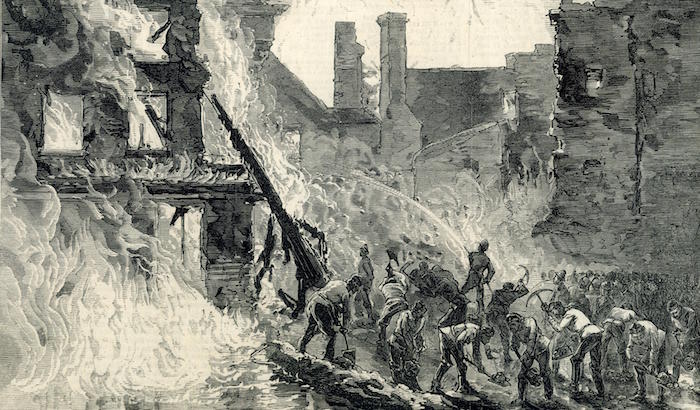Once a month here on the Molten Sulfur Blog, I run content taken from our book Archive: Historical People, Places, and Events for RPGs. This post is one of eighty entries in Archive, each more gameable than the last!
This post is brought to you by beloved Patreon backer Justin Moor. Thanks for helping keep the lights on! If you want to help keep this blog going alongside Justin, head over to the Patreon page – and thank you!

The Great Whiskey Fire
A Drunken Disaster
When we talk about great fires, those of London and Chicago get most of the attention. Dublin’s Great Whiskey Fire, though, was a tragic loss of both life and booze. Reid’s malt-house and Malone’s bonded warehouse caught fire just after 8pm in June of 1875. The fire might have been contained but for all the malts in the malt-house and the 5,000 barrels of whiskey in the warehouse. The alcohol caught fire and flowed into the streets of Dublin, carrying the blaze from one building to the next.
Sheets of flame lit up the night sky as burning whiskey flowed like lava through the impoverished neighborhood. A lucky gust of wind saved a convent and a maternity hospital, later deemed an act of God. Smoke billowed up to smother the air with an overbearing stench. Occupants of consumed tenements fled, leaving their possessions behind. Many people kept farm animals, and panicked swine broke free into the streets. Some Dubliners kept cooler heads than their neighbors. Many ran out with pots and pans, trying to collect the precious, burning liquid. Two porters were found lying barefoot in the street. They were insensible, having apparently used their boots to gather the liquor.
The Dublin Fire Brigade arrived, under the leadership of Captain James Robert Ingram. Ingram had been a fireman in the New York Fire Department. He was known for his unconventional strategies. On one occasion, instead of ordering his men to put out a fire on a blazing ship, he asked the Royal Navy to sink it. Ingram knew pouring water on the burning whisky would be disastrous. The liquor would float atop the water like gasoline and spread the fire faster. He first ordered his men to pull up paving stones and pour a mixture of sand and gravel on the whiskey. But he soon realized it wouldn’t be enough. There was so much whiskey flooding the streets that it began to seep through the sand. Ingram took a moment to think and proposed his next best plan. Horse manure. Lots of it. Luckily, piles of horse manure lay in depots around the city, so he ordered it brought to the fire by the cartload. The firemen shoveled wet excrement onto the streets to form dams. This tactic added the smell of cooking manure to the already atrocious atmosphere, but as the burning whiskey met the dams, it was soaked up and the fire began to subside.
The fire proved to be one of the most destructive in Dublin’s history. Only thirteen people died during the event, though none by flames, burns, or even smoke inhalation. Instead, they died of alcohol poisoning. Considering they were drinking a cocktail of whiskey, manure, and toxic effluent from the gutters, it’s a wonder more didn’t perish. In 2014, Malone’s Whiskey Company released a new whiskey called The Flaming Pig in honor of the fire: a much safer alternative!
The Great Whiskey Fire in Play
A heated bar fight that goes bad could lead to a similar event starting at a tavern where your party is staying. Or you could set an otherwise-ordinary combat encounter in a liquor warehouse and wait for the PCs’ shortsightedness to spark tragedy. Or the party could be relaxing peacefully when a flaming, screeching pig bolts past the window, two steps ahead of a river of fire. The odor would likely reach the party before the heat. Maybe, in the madness, your PCs get split up, and the villains who have been stalking them try to pick them off one by one. Will your PCs help put out the fire? Or will they be the ones grabbing pots, pans, and boots to grab some free liquor, facing unidentified consequences later? Drinking a weird mixture of possibly magic fire, manure, and sewage could even cause mutations.






